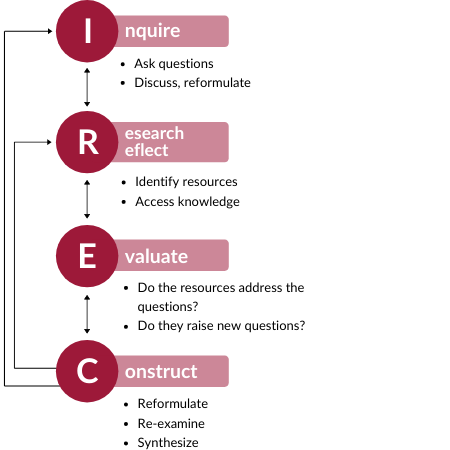What is Inquiry-Based Learning?
Based on John Dewey’s philosophy that education begins with the curiosity of the learner, inquiry in the classroom places the responsibility for learning on the students and encourages them to arrive at an understanding of concepts by themselves. Lee et al. (2004) defined inquiry-based learning as an "array of classroom practices that promote student learning through guided and, increasingly, independent investigation of complex questions and problems, often for which there is no single answer” (p. 9). Students are supported in developing their abilities to: ask good questions, determine what needs to be learned and what resources are required in order to answer those questions, and share their learning with others.
Ai et al. (2008) highlight the following four elements central to inquiry-based learning:

Inquiry learning is an increasing independent endeavour of growth. Students develop skills around each element of the inquiry process over time. One course may introduce some aspects of the inquiry process with a great degree of guidance and facilitation from instructors. Advanced courses may expand to include all four elements with students largely directing their own learning.
Why Teach Inquiry?
Self-direction is a critical skill for success in both post-secondary education and the workplace. Inquiry-based approaches to learning encourage students to build valuable and transferable skills, including:
- Realistic goal-setting and goal-tracking
- Time- and priority-management
- Information gathering, filtering, and integration
- Critical thinking
- Communication of ideas and learning
- Self-assessment and reflection
Inquiry-Based Teaching Strategies
Consider which essential features best suit your inquiry-focused course. Teaching strategies will vary depending on the degree of learner self-direction and direction provided by you the instructor.
Variations ranging from introductory to advanced inquiry:
- Learner engages in question provided by the instructor, materials, or other source
- Learner sharpens or clarifies question provided by instructor, materials, or other source
- Learner selects among questions, poses new questions
- Learner poses a question
Variations ranging from introductory to advanced inquiry:
- Learner is given data and is directed or guided on how to analyze it
- Learner is given data and is asked to analyze it with less guidance from the instructor
- Learner is directed to collect certain data and does so with a varying degree of guidance
- Learner determines what constitutes evidence and collects it mostly in a self-directed manner
Variations ranging from introductory to advanced inquiry:
- Learner is provided with evidence and is guided on how to use the evidence to formulate an explanation
- Learner is given possible ways to use evidence to formulate explanation
- Learner is guided in process of formulating explanations from the evidence
- Learner formulates explanation after summarizing the evidence in a mostly self-directed manner
Variations ranging from introductory to advanced inquiry:
- Instructor demonstrates possible connections between explanations and scientific knowledge
- Learner is guided toward areas and sources of scientific knowledge and draws connections to explanations
- Learner independently examines other resources and forms the links to explanations
Variations ranging from introductory to advanced inquiry:
- Instructor provides learners guidance on given steps and procedures for communication
- Learner is provided broad guidelines to apply in sharpening their communication
- Learner coached in development of communication
- Learner forms reasonable and logical argument to communicate explanations in a mostly self-directed manner
As a case example, our colleagues at McMaster follow a particular approach to designing and facilitating inquiry-based courses. They suggest that teaching through “inquiry” involves engaging students in the research process with instructors supporting and coaching students at a level appropriate to their starting skills. Students learn discipline-specific content while at the same time engaging and refining their inquiry skills. An inquiry course:
- Is question-driven, rather than topic- or thesis-driven.
- Begins with a general theme to act as a starting point or trigger for learning.
- Emphasizes asking researchable questions on the theme and coaches students in doing this.
- Builds library, interview, and web search skills, along with the critical thinking skills necessary for thoughtful review of the information.
- Coaches students on how to best report their learning in oral or written form.
- Provides some mechanism (interviews, drafts, minutes of group meetings, bench mark activities, etc.) to help students monitor their progress within the course.
- Draws on the expertise and knowledge of the instructor to model effective inquiry and to promote reflection.
Resources for Designing Inquiry-Based Courses:
Instructional Design Models and Theories: Inquiry-based Learning Model
Explanation of 5 steps, principles of, and 4 types of inquiry-based learning.
Institute for Inquiry
Created in response to widespread interest in inquiry-based science instruction, the Exploratorium Institute for Inquiry provides workshops, programs, on-line support, and an intellectual community of practice which affords science reform educators a deep and rich experience of how inquiry learning looks and feels.
Guide to Curriculum Design: Enquiry-Based Learning
Guide produced by the Imaginative Curriculum Network (University of Manchester) to stimulate thinking and promote good practice in curriculum design.
A Questioning Toolkit
Different types of questioning tools for students of all ages.
References
Ai, R., Bhatt, M., Chevrier, S., Ciccarelli, R., Grady, R., Kumari, V., … Wong, H. (2008). Choose your own inquiry. Lanham, MD: University Press of America.
Lee, V. S., Greene, D. B., Odom, J., Schechter, E., & Slatta, R. W. (2004). What is inquiryguided learning. In V. S. Lee (Ed.), Teaching and learning through inquiry: A guidebook for institutions and instructors (pp. 3-15). Sterling, VA: Stylus Publishing.